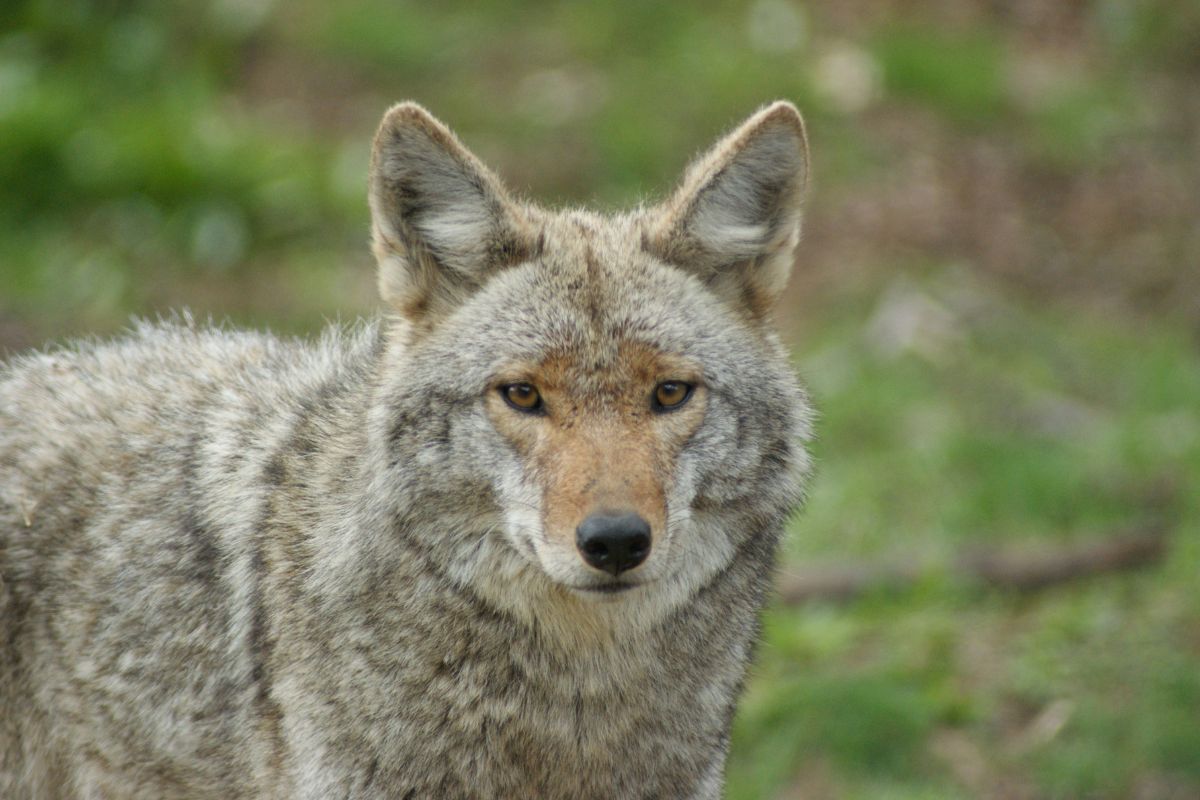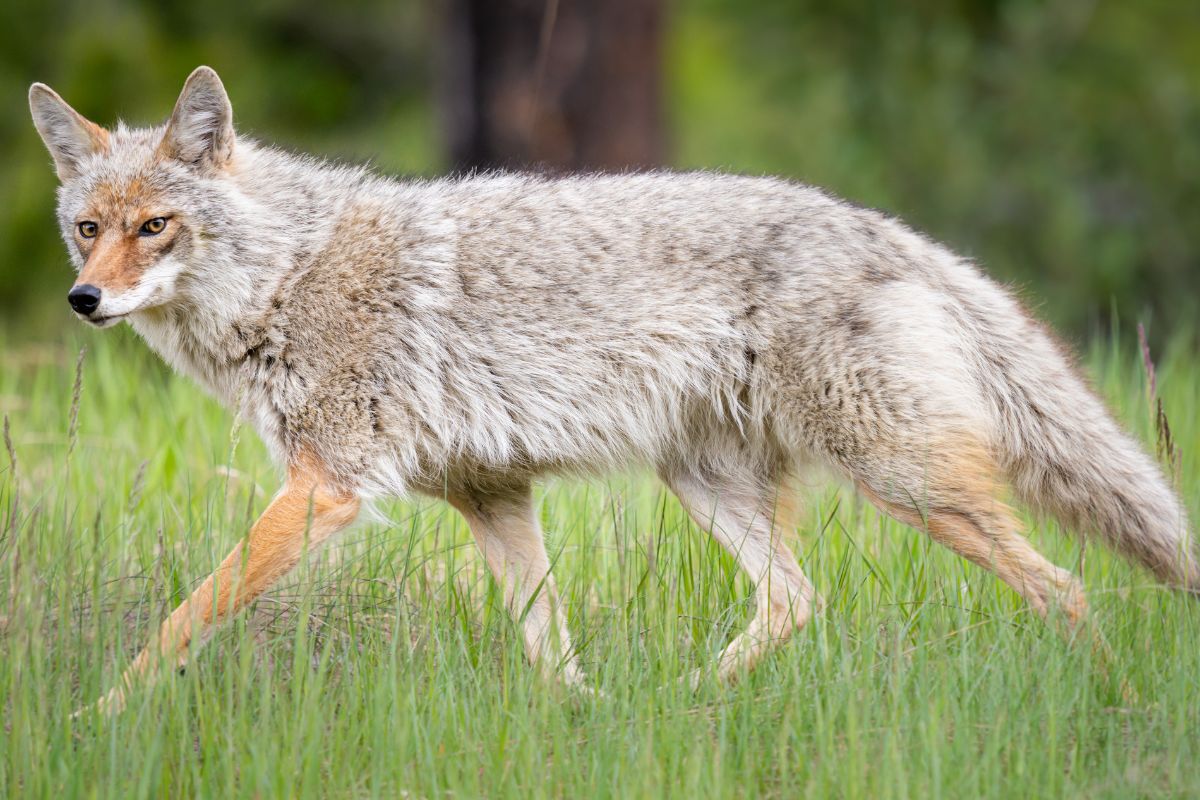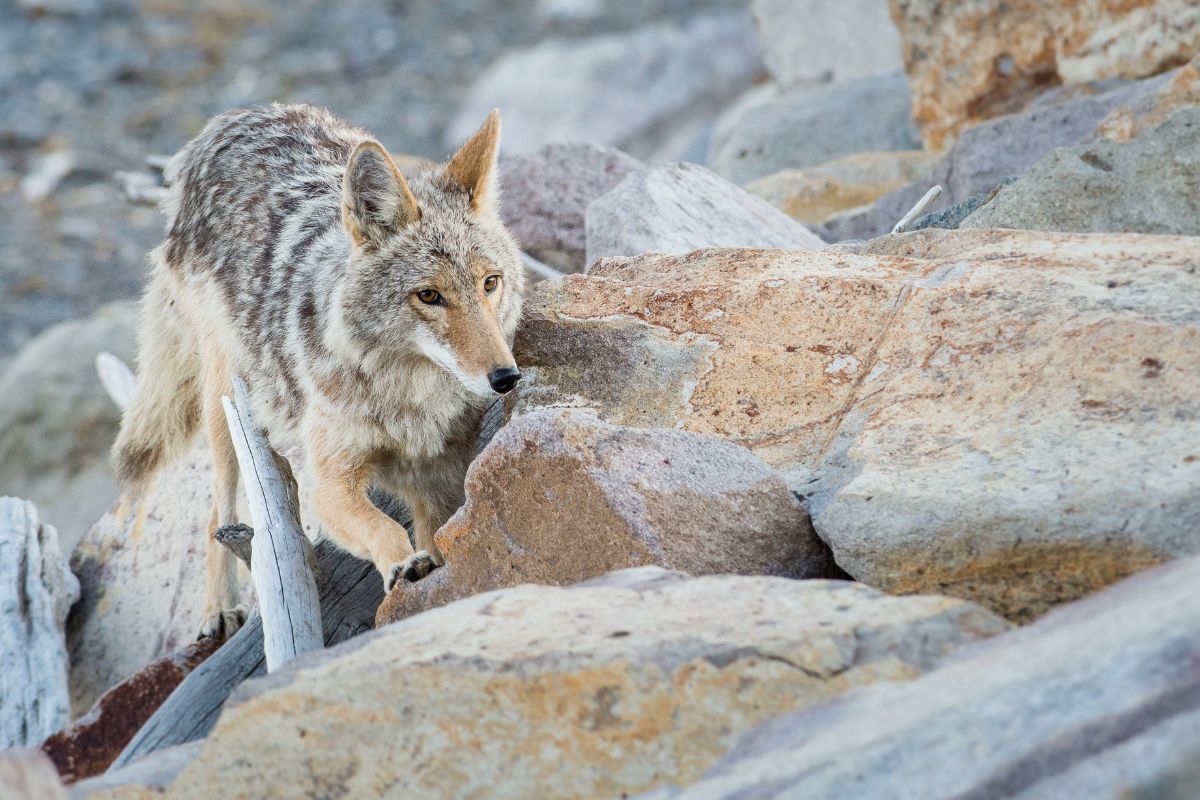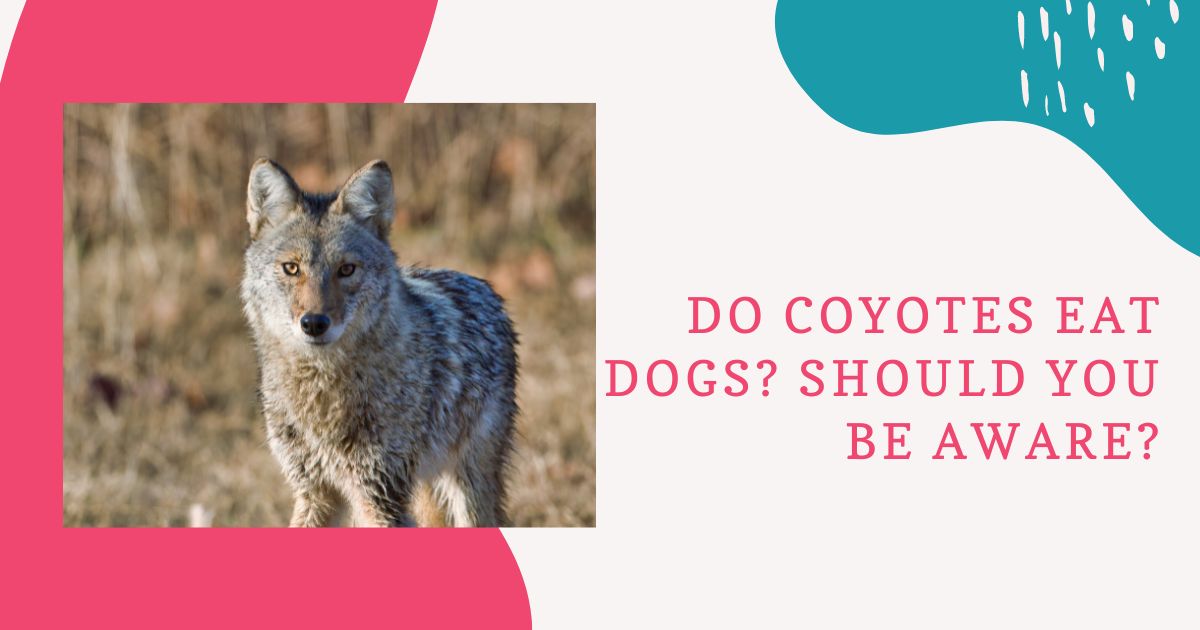Do Coyotes Eat Dogs?
Have you ever wondered, do coyotes eat dogs? In this article, we will dive deep into what coyotes are and how to keep your dogs safe from Coyotes.
A coyote is a predator canine that will scavenge on smaller animals like rabbits, hares, rodents, birds, and even snakes.
A coyote will eat a dog, especially a smaller one when an opportunity arises.

Why Do Coyotes Eat Dogs?
When coyotes will attack and eat your dog in cases where they are hungry, to provide for their young ones, or when they are desperate when they feel threatened.
The question then arises: do coyotes eat small dogs? Coyotes will usually eat dogs that weigh less than 50 pounds (23 kilograms) as they are easy to defeat.
A coyote attack on a dog is usually opportunistic and can be avoided by following certain steps to protect your dog.
Are Coyotes Dangerous?
Coyotes are potentially dangerous to small pets and even small children. Coyotes are hazardous to small livestock such as chickens or turkeys as they can easily attack and kill.
Typically a coyote will not attack a human being as long as they are not feeling threatened. Coyotes’ response to humans is usually in reaction to the actions and behavior of the human.
Coyotes can be dangerous to humans, especially babies, as they see them as small animals that they consume. Coyotes will chase and attempt to bite a human but cease as soon as the human challenges them.
Another danger of coyotes is that they carry the rabies virus, which is fatal to humans and canines.
If you are scratched or bitten by a coyote, treat it as exposure to the virus and seek medical help immediately. Treatment of rabies is only with a vaccine administered as early as possible.
Coyotes also carry fleas, ticks, and other disease-carrying parasites that will affect the health of your pets, livestock, and yourself.
Therefore to answer the question are coyotes dangerous; the simplest answer is yes, coyotes are a danger for pets, and they also spread diseases.
Where Do Coyotes Live?
Now that we know what coyotes are dangerous, we guess you would like to know where coyotes live.
Knowing where coyotes live will help you understand their habitat and how best to protect yourself and your canines.
Coyotes are native to North America but are also habitats in Central and South America. Their natural habitat is they roam in the wild and wander in deserts, plains, hilly areas, tropical and subtropical climates, urban and suburbs, grasslands, tundra, and even swamps.
During pup season, coyotes will live in dens to protect their young ones; otherwise, they live in the open or where there is coverage, like under a tree.
Coyotes will excavate their dens or use spaces such as hollow trees or existing rock outcrops. They will also seek shelter in abandoned buildings and other areas where they can stay hidden.
What Else Do Coyotes Eat?
Coyotes are carnivores; their diet mainly consists of what they can catch or what is available, so what animals do coyotes eat? Coyotes eat smaller animals like rodents, reptiles, fish, birds, deer, snakes, and rabbits. One common question is whether coyotes eat rabbits as they are popular pets.
Coyotes will feed on anything as they are highly opportunistic, incredibly when hungry. In rare cases when they cannot find prey, they eat fruit and vegetables, especially in winter.
Coyote diets will vary depending on the time of the year and their current habitat. So are coyotes omnivores? Yes, they are omnivores, as they can feed on animal flesh and plants.
Coyotes will eat other household pets such as cats, chickens, or any other small animal. If you have any domesticated animals, it is best to make sure they have an enclosure high enough to protect them from a coyote attack.
Young coyotes will chew on homes which will shorten and enlarge the bones in their skulls. The early diet will strengthen their jaw area, enabling them to enjoy and eat hard foods when older.
Even though coyotes are not human’s favorite animal, they are an important part of the ecosystem as they contribute the following to the wellness of the environment.
- Coyotes act as a natural pesticide in helping control rodents. Mammals like rats and rodents, which carry diseases, reproduce quickly, and predator animals like coyotes help reduce their population.
- Geese will not report dice as fast and overpopulating, taking over and destroying parks and golf courses.
- Fleas can cause damage to crops and the environment. Coyotes prevent the infestation and spread of fleas by feeding flea carriers like deer.
Are Coyotes Dangerous to Humans?
It is a very rare occurrence, but coyotes will attack humans. Coyotes are small compared to humans; in most cases, an attack by a coyote will not cause severe harm.
So if they can attack, are coyotes dangerous to humans? A coyote will attack humans if they feel threatened, and if this happens, you do not run away from a coyote if confronted. Rather, stand your ground and make gestures and noises for it to leave, and usually, the coyote will retreat.
Do Coyotes Eat Humans?
Typically coyotes are opportunistic prey animals but will not target humans as a food source. They will, however, lose their fear of humans if entertainment in neighborhoods. Feeding coyotes is dangerous, and it is strongly discouraged.
Coyotes will most likely attack children due to their small size and may see the child as a small animal.
Never run away from a coyote; stand your ground, make direct eye contact, and haze it out by making noise. A coyote will attack you if you run away but will scare you off when you face it.
Always carry items that protect you from an attack, such as pepper spray, when hiking in areas where coyotes are likely to live.

How Much Do Coyotes Weigh?
How much do coyotes weigh? The weight of a coyote will depend on whether they are male or female. Coyotes have 19 recognized subspecies, and female coyotes are much lighter than male coyotes. The average male weighs 18 to 44 lb (8 to 20 kg), and the average female 15to 40 lb (7 to 18 kg).
What to Do if a Coyote Attacks Your Dog?
Coyotes are ferocious animals and will usually come after your dog. The attack intends to disarm and kill, so they go for the neck area. The bite will result in excessive bleeding, which can lead to the death of your dog. The first fifteen seconds after the attack are critical, determining whether your pet lives or dies. Here is what to do if a coyote attacks your dog.
- Ensure the coyote leaves the area by making loud noises, shouting and waving arms, or throwing objects such as sticks and stones. You can also use a whistle, tap on cans, or blow a loud horn anything to irritate the coyote to run off.
- If you have it close by, use pepper spray or unleash the hose pipe on the coyote. The goal is to instill fear so that the coyote does not return.
- Find some disposable gloves and apply pressure to the wound to stop any bleeding. While your first instinct is to cover the injury, remember coyotes carry rabies found in their saliva. Infected saliva that will come in contact with any open wound on your body could result in you getting a rabies infection which will usually result in death.
- Do not attempt to treat the wound at home; take the dog to the veterinarian immediately, and don’t forget to mention the coyote attack.
- While it may seem like a natural response to killing a coyote when it attacks your dog, do not do so. Coyotes have protection under the law, and in some states, killing a coyote is not allowed. If you make enough noise, a coyote will run off if you make noises to scare them away.
What Attracts Coyotes?
There is a rising number of coyotes roaming the suburbs and urban areas. What attracts coyotes to come near humans in the suburbs and the city is due to the following reason:
- They are searching for food. A coyote will come to your yarn to forage for food they have smelled. Coyotes will scavenge for food scraps, pet food or even go for bird feeders.
- Coyotes are not looking for leftover food; however, overflowing trash cans are where rodents find their food. Coyotes find areas where rodents are attractive, as this means a source of food.
- Coyotes also like abandoned spaces where they can keep cool in extremely warm temperatures. During mating season, coyotes are looking for a space to safely raise their offspring until they are old enough to make their way.
- Coyotes will hide under places with crevices or mimicking caves, such as under the porch, trees, decks, and bushes.
- Coyotes need water, and they find fresh bodies of water attractive. Some of the prey a coyote feeds on, such as reptiles, live close to water, and a coyote is smart enough and will use a water source as a hunting ground.
How Often Do Coyotes Go for Canines?
Coyotes will go after dogs often, especially small dogs. Rarely will a coyote go after a large dog; however, a coyote will do so mostly to protect its territory, especially during mating season in January.
Protect your canines from coyote attacks by supervising them when they are outside. Have a high enough fence or keep the dogs indoors when unsupervised.
Do not assume that your dog will win in a scraffle with a coyote; always walk your dog on a short leash for a quick reaction in case of an attack. Avoid walking your dog during dawn or dusk, as this is when coyotes are hunting for food.
What Types of Dogs Do Coyotes Eat?
We know that coyotes are dangerous but can a coyote kill a dog? Coyotes will eat small breeds of dogs below 50 pounds (23 kilograms), such as Pomeranians and Daschunds, as they find them easy to disarm.
Always be aware and alert when you have small dogs, and never leave them unattended outside, as coyotes will easily target them.
Is There Any Dog That Can Fight Off a Coyote?
Coyotes are naturally sleek scavengers who attack their prey when they feel threatened. Coyotes are known to attack dogs, but certain breeds can successfully fight off a coyote. Dogs that can fight off a coyote have some, if not all, of these characteristics:
- They are large dogs and weigh more than 50 pounds (23 kilograms). A successful attack by a coyote usually relies on the prey being smaller than the coyote.
- Dogs bred as guard dogs will intimidate the coyote using its size and will attack if the coyote is close enough.
- Dogs are bred to be aggressive and kept for protection. They can detect a threat and fight off intruders or danger before it can cause any harm.
- Hunting dogs with a mild temper will warn the owner of an impending attack by a coyote.
Most large dogs can fight and diffuse a coyote causing it to run away or even kill it. Here is a list of dog breeds that can fight off a coyote you will want to consider keeping on your property for security in case of coyote attacks.
The Rottweiler
Rottweilers are much bigger than coyotes in both weight and height. Rottweilers are fearless, loyal, and naturally protective and will get aggressive if they feel an evasion of their territory.
A Rottweiler will attack, fight and win a scrape with a coyote.
The Wolf Dogs
The wolf dog is a large, aggressive dog with sharp canine teeth. Wild dogs are not easy to domesticate and protect their territory and each other. They will fight a coyote and succeed in a pack rather than as an individual dog.
The Neopolitan Mastiff
The mastic is a breed of dogs originally from England and is considered work dogs used in hunting, guarding property, and as military dogs.
Mastiffs are one of the largest dog breeds and protect their family and territory. A mastiff will fight a coyote and win in one-on-one combat.
The German Shepherd
The German Shepherd, as per the name, is originally from Germany. They are working dogs for security, and herding, are part of the police service, and act as war dogs.
German Shepherds, while large, are not as strong as other dogs, but their need to protect their territory will cause them to win a fight with a coyote.
The Bloodhounds
Bloodhounds specialize in tracking those serving well as hunting dogs. They can track the scents of wild boars and other animals, including humans.
They will not necessarily win a fight with coyotes but will help in tracking. Due to their extraordinary sense of smell and tracking instincts, Bloodhounds are common in law enforcement.
The Kangals
Kangals are originally from Turkey and are usually guard dogs for the property and livestock. Kangals have high survival instincts and will not allow coyotes to take over their territory.
The Doberman Pinscher
The Doberman Pinscher is another large dog breed from Germany. They are loyal and fearless and do not have an aggressive nature when they sense their family is in danger. The aggressiveness gives them an upper hand during a fight, and they are most likely to defeat coyotes.
The Pit Bulls
Pitbulls are known for their aggressive personality; this is due to abuse and poor training. Pitbulls can be domesticated, make good security dogs, and protect you from coyotes.
Pitbulls are very defensive when feeling threatened and will easily fight and win when faced with a coyote.
The Dogo Argentino
The Dogo Argentino has a sense of duty and is brave when there is a need to protect its owners. Widely used in law enforcement, a Dogo Argentino will kill a coyote in a fight when it feels its territory is under threat.
The Sarplaninac
Sarplaninac is not friendly with other pets and is usually suspicious of strangers. However, Sarplaninac is protective and loyal, and brave when they believe there is danger lurking. Sarplaninac will defeat and kill a coyote in a one-on-one fight.
The Tosa Inu
The Tosa Inu is originally from Japan and is a fighting dog. Their fighting spirit makes their courage with a sense of loyalty, and they are obedient when properly trained. They will easily win in a scuffle with a coyote, largely depending on their biting strength.
The Siberian Husky
Do not be deceived by the Siberian Husky cute look with its beautiful black and white fur; they are vicious when necessary. They have a mild temperament used extensively in sledding, herding, and protection.
They are easily domesticated due to their playful, social and friendly nature but will protect their family if evaded by a coyote.
The Irish Wolfhound
As per the name, the Irish Wolfhound is a large dog breed originally from Ireland and popular for hunting. They are not aggressive or protective, but they will win a fight with a coyote due to their weight advantage and their sense of loyalty.
The Great Pyrenees
The Great Pyrenees are originally from France and have and have the instinct to hunt and catch prey. This dog is not ideal when you have other pets on the property, such as cats and livestock like chickens. However, this characteristic, in addition to their weight and height, will attack and fight a coyote.
The Cane Corso
The Cane Corso are work dogs and love keeping busy due to their high energy levels. They are great for hunting and protecting livestock. They will provide protection when a coyote attacks.
Can Coyotes Jump Fences?
Yes, coyotes can jump fences and have the ability to jump up to 6 feet (1.8 meters), especially when they are chasing prey. They can also squeeze through gaps underneath and between fences or gates.
Prevent coyotes from entering your yard; your fence must be 8 feet (2.4 meters) tall. Fix any broken parts of your fence, and you can add spiky plants and chicken wire so that they cannot get through.
How to Keep Your Canine Coyote-Safe
Now that we know everything about coyotes, how they function, and that our pets are not safe, there are steps you can take to protect your canines.
- Secure your trash. Rotting trash will attract rodents which will, in turn, attract coyotes. Coyotes, as noted, will eat anything, but open trash areas represent an abundant food supply.
- Keep your animals inside or provide secure enclosures. If you have to take your canine outside, it is always best to supervise in case a coyote is lurking around.
- Install motion sensor lighting around your perimeter fence. A sudden flash of light will startle a coyote which is usually very skittish, trying to sneak through your yard.
- Learn how to chase away a coyote; usually, shouting, screaming, and waving hands will cause the coyote to scurry away. Any loud noise, such as banging and cluttering metal, will scare a coyote away. You can also keep pepper spray handy if they do not scare after the initial hazing.
- Coyotes will get comfortable if humans are feeding them. When they get used to humans, they lose their fear, which is dangerous as it can lead to attacks. When you encounter a coyote, regularly call the authorities so they help remove it from the neighborhood.
- Coyotes are aggressive during mating season and are also looking for shelter and a constant food source during mating season. Be aware of the coyote mating season, which is between January and March, and ensure you have secured your yard to avoid encroachment.
- Keep your yard clean, trip bushes, secure abandoned sheds and cover up crevices and other spaces where coyotes would find shelter.
- Coyotes are most active early mornings and late evenings; avoid taking your dogs for a walk during these times. Use a leash when you take your dogs for a walk to easily pull them back and protect your canine in case of a coyote attack.
- Coyotes can eat anything, so make sure there is no leftover food outside and pick any fruits or vegetables that have fallen to the ground.
- Report to authorities sightings of coyotes crossing the road or lounging in someone’s yarn or when you encounter an aggressive coyote. Coyotes must not get used to humans as they become a danger to you and your pets.
- Dispose of roadkill immediately as coyotes are attracted to the rotting flesh.

Final Words
Coyotes are scavengers and will eat your dog if the opportunity arises. Small dogs are an easy target for coyotes as they resemble other animals in their diet. Coyotes will, however, not attack large dogs as they know they cannot win that fight.
Take all the necessary precautions to protect your dogs from coyote attacks. Coyotes will usually not attack humans; however, babies are susceptible to attacks.
If a coyote bites your dog, immediately seek veterinarian assistance, as the bite can be fatal.

